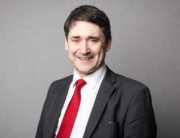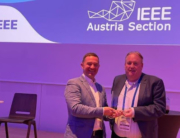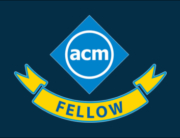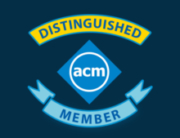 Thank you to the Australian Computer Society (ACS) and President Dr Nick Tate for hosting the IFIP Strategy Day and Board Meeting at the offices of the ACS in Barangaroo in Sydney, Australia on April 13-14.
Thank you to the Australian Computer Society (ACS) and President Dr Nick Tate for hosting the IFIP Strategy Day and Board Meeting at the offices of the ACS in Barangaroo in Sydney, Australia on April 13-14.
During the Strategy Day on 13th April, ACS President Dr Tate welcomed attendees to Country and IFIP President Anthony Wong revisited IFIP’s mission to “achieve the worldwide professional and socially responsible development and application of information and communication technologies”, describing the international body’s great mission for humanity.
“We are an independent voice for the world. IFIP with its Member Societies has half a million experts across 5 continents – how do we harness that expertise,” he asked?
IFIP Member Presidents and their representatives also attended the hybrid Strategy Day in person with the remainder dialling in via Zoom. (See Wouter Bronsgeest’s column at the end of this article). The IFIP Secretariat was supported by rapporteurs TC3 Secretary Sharon Singh, TC 8 Secretary Dale MacKrell, Oliver Burmeister TC9, Marcus Belder TC11 and Simeon Simoff TC12.
The day explored a wide range of strategic sessions including:
- Development of a new IFIP website,
- Creating an ecosystem to support the work of Technical Committees, Working Groups and Domain Committees,
- Enhancing internal Member and external stakeholder engagements with external stakeholders like the UN Commission for Science and Technology for development, UNESCO, ITU, UNCTAD and UNIDO,
- IFIP participation in the 2023 WSIS Forum (see separate article),
- Work being done by new IFIP Task Forces on Climate Change & Technology, and Digital Sustainable Education,
- IP3 accreditation activities, including accreditations of CIPS, ACS, IPSJ and CSSL,
- IFIP member engagement strategies,
- A model for Member engagement – Schweizer Informatik Gesellschaft (SI) proposal on electronic ID,
- Digital Equity strategies,
- IFIP Digital Library, and more.
ACS Think Tank Features IFIP Experts
 The Strategy Day on 13th April concluded with a livestreamed ACS Think Tank event featuring several IFIP Board members.
The Strategy Day on 13th April concluded with a livestreamed ACS Think Tank event featuring several IFIP Board members.
Moderated by IFIP Member Societies Assembly Chair and ACS Vice-President David Cook, the event explored the topic of “Worldwide Digital Transformation: The challenges for Global Governance and Professionalism in IT”. Guest panellists included:
- IFIP Past President Mike Hinchey,
- IFIP TC9 Chair David Kreps,
- IFIP President Anthony Wong,
- IFIP Vice President Elizabeth Eastwood, and
- IFIP General Secretary Anatolii Marushchak.
The panel explored the five challenges for global governance and professionalism: cybersecurity, data privacy, the digital divide, ethics and IT professionalism brought about by the emergence of worldwide digital transformation.
Mr Wong highlighted the role of education in addressing the widening digital divide, referencing the preliminary findings of the IFIP Task Force on Digital Sustainable Education at WSIS 2023 to meet this need.
Amid discussion about the advent of AI chatbots like ChatGPT and the resulting hype and misinformation in the media, David Kreps called for teachers and academics to rethink how they assess their students and the kinds of assignments they set.
Liz Eastwood underlined the importance of professionalism in delivering project outcomes, pointing to the disastrous payroll implementation at the NZ Ministry of Education. “It was a complete mess that affected the whole country – they needed to appoint an IT professional of the right calibre who could influence decisions in the right way and be a trusted advisor, a trusted expert.”
Mr Wong agreed, referencing the Australian Government’s infamous RoboDebt debacle which has reignited the debate on how algorithms and data matching are used for automated debt-collection, and reinforcing the need for organisations to consider the implications and repercussions of how they implement technology.
Mike Hinchey continued that theme, saying we must address the fundamentals and teach budding technologists the principles. “Who knows what the hot jobs will be in 10 years time – things are changing so fast. But if you understand the principles, you can always adapt to new developments.”
Anatolii Marushchak stressed the need for big tech to think about their human users. “We need legislation that will oblige big tech to moderate their approach and to provide systems to counter disinformation and hate speech. The current lack of liability means we’re like in the wild west – in the near future we will have better regulation.”
David Kreps also took aim at the way some tech companies want the freedom to innovate at light speed with little or no regard for the impact on consumer privacy, calling for greater protection for users, a topic on which all panellists agreed.
The last word went to Mr Wong, who reinforced the need to resolve the digital divide and educate people about their rights and how to protect themselves on the journey of digital transformation.
Jet Lag Without the Jet: IFIP Virtual Board Meeting Across Time Zones
 By KNVI President Wouter Bronsgeest
By KNVI President Wouter Bronsgeest
With a self-inflicted jet lag, I am sitting at my PCs this week as an attendee/councillor at the IFIP Board Meeting. The now 60-plus year young International Federation for Information Processing talks with those involved about strengthening the field and the substantive issues at hand. This time around, the IFIP Board is meeting in Sydney.
Some of the participants took the decision to participate online – resulting in attending the meetings in the middle of the night. It always gives a special “vibe” to take a substantive step with professionals from so many countries. Sometimes differences between countries seem so big – but in practice they are not. Some (unwritten) cultural etiquette rules of meetings must be observed, that is true. But when it comes to professional and scientific content and the positioning of the profession, everyone finds each other.
| IFIP is a leading, multinational and apolitical organisation in the field of information processing, recognised by the United Nations. IFIP was founded in 1960 after UNESCO’s first World Computer Congress was held in Paris in 1959. IFIP has 13 Technical Committees (TCs). Each TC represents a topic related to information processing, for example, such as security and privacy, human-computer interaction and information systems. |
One question is whether an “association” is still a good form of organisation anno 2023. The answer is given by looking at the numbers. The number of scientists meeting in associations within IFIP is only growing. The number goes to nearly 7,000 worldwide – regardless of political affiliations, across country borders and focused on content. Together they published over 100 scientific papers in 2022 and organised many national and international events.
The answer is also given from the themes addressed internationally. One of these is the ethical conduct of professionals and the impact of technology on society with all its positive and negative consequences. Technology is neutral; in its application things can sometimes go wrong – as the Dutch KNVI also addresses in its theme ‘Smart Humanity’.
Ethics is therefore a thread that runs through all IFIP themes. IFIP’s International ‘Code of Ethics’ therefore helps information professionals to have important conversations about ethical issues. Internationally, the code has been adopted by several member states. IFIP deepens the conversation through the topics taken up by the Technical Committees and through multidisciplinary themes such as eHealth, Open Access and access to information, Climate & Technology, Digital Equity, AI, Internet of Things, and Quantum Computing and a focus on Professionalism.
Then when you engage – no matter the time zone – in conversation about this content, that conversation never falls silent. These are topics we all work on around the world 24×7. During the day, and also at night!





